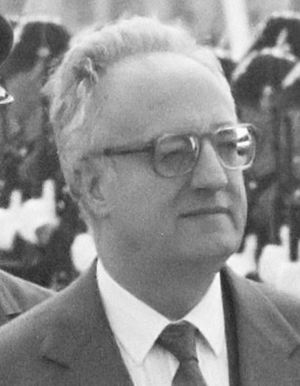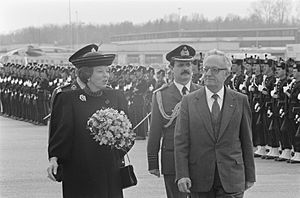Christos Sartzetakis facts for kids
Quick facts for kids
Christos Sartzetakis
Χρήστος Σαρτζετάκης |
|
|---|---|

Sartzetakis in 1989
|
|
| President of Greece | |
| In office 30 March 1985 – 5 May 1990 |
|
| Prime Minister | Andreas Papandreou Tzannis Tzannetakis Ioannis Grivas Xenophon Zolotas Konstantinos Mitsotakis |
| Preceded by | Ioannis Alevras (Acting) |
| Succeeded by | Konstantinos Karamanlis |
| Personal details | |
| Born | 6 April 1929 Thessaloniki, Greece |
| Died | 3 February 2022 (aged 92) Athens, Greece |
| Political party | Independent |
| Children | 1 |
| Alma mater | University of Thessaloniki |
Christos Sartzetakis (Greek: Χρήστος Σαρτζετάκης; 6 April 1929 – 3 February 2022) was a Greek judge and lawyer. He became the president of Greece and served from 1985 to 1990. He was known for his strong sense of justice throughout his career.
Contents
Early Life and Education
Christos Sartzetakis was born in Neapoli, Thessaloniki, Greece, on 6 April 1929. His father was a police officer from Crete, and his mother was from Greek Macedonia.
He studied law at the Aristotle University of Thessaloniki. This is a well-known university in Greece.
Legal Career: A Judge for Justice
Sartzetakis began his career as a judge in 1955. He first worked as a Justice of the Peace in a small town. By 1963, he was a judge in Thessaloniki.
Investigating a Big Case
In 1963, a politician named Grigoris Lambrakis died after being attacked. Sartzetakis was chosen to investigate this important case. He found evidence that the police and the government might have been involved in the murder. He even ordered the arrest of some police officers.
The trial started in 1966. Sartzetakis faced a lot of pressure to close the case quickly. However, he insisted on a full investigation. In the end, many people were found innocent, and only two were convicted. These two were later pardoned by the military government that took over Greece. Sartzetakis believed Lambrakis's death was a political murder.
Standing Up to the Military Government
Because of his honest work on the Lambrakis case, Sartzetakis was removed from his job in 1968 by the Greek Junta (a military government). They said he was unfair and let his political beliefs affect his work.
The story of the Lambrakis investigation was made into a famous book and a 1969 film called Z. In the film, a character based on Sartzetakis was played by actor Jean-Louis Trintignant.
After being removed from his job, Sartzetakis went to Paris to study more about law. He was arrested twice by the military government and even tortured. But after many people around the world spoke out, he was released in 1971.
Returning to Justice
In 1974, when democracy returned to Greece, Sartzetakis got his job back. He continued to serve as a judge. In 1976, he made a notable decision when he refused to send a person accused of political crimes back to Germany. He said the Greek constitution protected people in such cases. He became a high-ranking judge in Greece's Supreme Court in 1982.
Presidency (1985-1990)
In 1985, Greece was getting ready to elect a new president. The Prime Minister at the time, Andreas Papandreou, chose Christos Sartzetakis as his candidate. Sartzetakis was a judge and had not been involved in politics before.
Becoming President
The election was a bit complicated. The first two votes in the Greek parliament did not give Sartzetakis enough support. The third vote was held on 29 March. Sartzetakis was finally elected as the new president for a 5-year term. He won with the votes of 180 members of parliament.
He was sworn in on 30 March. After becoming president, he gave a speech. He asked all Greeks to unite, saying that Greece was "too small to support the luxury of national divisions."

During his time as president, Greece faced some political challenges. There were three elections between 1989 and 1990 because parties found it hard to form a government.
Presidential Style
Sartzetakis was known for being very formal and strict. He used an older, more traditional form of the Greek language. Some people criticized his formal style. However, he showed respect to other important political leaders.
He was also criticized for some purchases made during official trips. He was also involved in a few legal cases against comedians who made fun of him. In one case, a comedian was sued for making fun of religious symbols, but he was found innocent.
Sartzetakis was the first president to welcome members of the Greek resistance movement to the Presidential Palace. This was a special event to celebrate their fight for freedom.
Even though he had strong opinions against communism, he believed in national unity. He thought it was important for Greeks to remember their history and work together. He even cooperated with a communist leader during a political crisis.
His term as president ended on 5 May 1990. Konstantinos Karamanlis became president after him. After leaving office, Sartzetakis retired from public life. However, he continued to share his thoughts and opinions in newspapers and on his website.
Personal Life and Death
Christos Sartzetakis was married to Efi Argyriou. They had one daughter together.
He passed away on 3 February 2022, at the age of 92, due to breathing problems. The Greek government announced a period of national mourning. His funeral was held at the Metropolitan Cathedral of Athens. He was buried in the First Cemetery of Athens.
Honours
- Grand Collar of the Order of Prince Henry (Portugal, 1990)
See also
 In Spanish: Christos Sartzetakis para niños
In Spanish: Christos Sartzetakis para niños
 | Sharif Bey |
 | Hale Woodruff |
 | Richmond Barthé |
 | Purvis Young |

